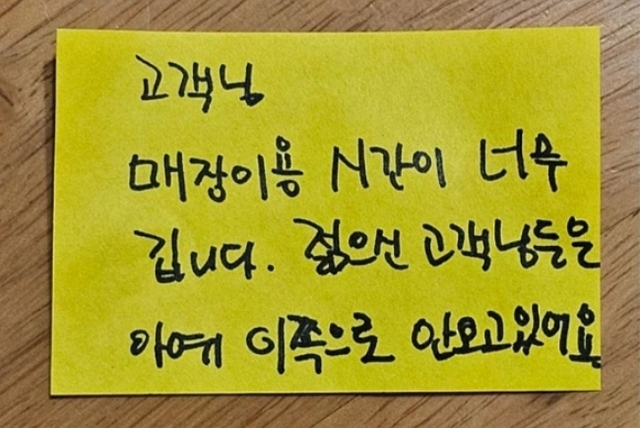A recent incident at a local coffee shop sparked controversy when an elderly customer received a note from the cafe owner addressing the excessive duration of their visits. The note also raised concerns over potential age-based discrimination because it stated, "The duration of your visits is too long and young customers are not behaving this way at all." As the post spread and the controversy over the perceived elderly discrimination grew, the cafe owner released CCTV footage to the media to clarify their intentions and dispel allegations of discrimination. This footage clearly shows the customer arriving at 11:10 a.m. and remaining for approximately seven hours with a single cup of coffee. The customer only left about 50 minutes before returning back. Despite the café’s best efforts, controversy over this case has continued, and the debate over age-related discrimination in the “No OO Zone” has grown.
The “No OO Zone” continues to resurface with the defined target of prohibition expanding. One recent example that has reignited the controversy is the emergence of a “No-Senior Zone.” The owner of the small cafe, who previously stirred controversy with a “No-Senior Zone” policy, clarified her stance. Owning a small café alone in a residential area, she said she was afraid to handle elderly customers who occasionally made sexual harassment comments such as "the coffee tastes good thanks to the pretty madame". In addition, the controversial “No-Kids Zone”, which has been at the center of debates in recent years, is now being expanded to include a "No-Middle School Student Zone" in study cafes prohibiting middle school students from entering. Study cafes, especially unmanned ones have banned middle school students from use due to numerous complaints about late-night disturbances. As such, most owners declare a “No OO Zone” to preserve smooth business operations and safeguard the comfort of their mainstream customers. It restricts all customers of specific age groups to prevent disruptions from certain problematic customer groups. In addition to expanding beyond age boundaries, the “No OO zone” is evolving to include restricting access by job and religion denomination.
 |
| ▲ A note received by the elderly about the duration of his visits. (Photo from The Farmers Newspaper) |
Any space that identifies itself as a “No OO Zone” can lead to clear discrimination. Assuming that an entire age group will engage in the same behavior just because of a few bad actors is an unreasonable generalization. Denying access to the facility based on a specific age group is an obvious form of discrimination. In 2017, the National Human Rights Commission of Korea deemed the actions of a restaurant in Jeju Island, which promoted a "No-Kids Zone," as an act of discrimination. Furthermore, a VIP lounge in a department store that was operating as a "No-Kids Zone" was considered a violation of customers' rights to equality and pursuit of happiness in September of last year. Additionally, the "No OO Zone" can unintentionally lead to age segregation. In Korea, the cause of such intergenerational conflicts is predominantly attributed to the disparity between the pace of industrial and cultural development. Moreover, factors such as the information age and demographic changes are pointed out as reasons for these conflicts. Differences in information access and digital exclusion, alongside challenges such as declining birth rates, an aging population, and decreasing overall population, have made it harder for different generations to communicate with each other. Finally, the trend towards nuclear families and the increase in single-person households has disrupted intergenerational communication. As a result, a lack of understanding and exchange between generations has led to seeing the different goals and values between generations as wrong, not just recognizing them as simply different.
The Dankook Herald interviewed Ahn Hye-won (Senior, Dept. of Law of Dankook University) and Selen Celik Johannes (Senior, Dept. of Law of Gutenberg University) to learn more about their perspectives on this intergenerational conflict. According to Johannes, phenomena or explicit regulations such as the “No OO Zone” are rare in Germany. However, while there are no places that discriminate against a specific age group like the “No OO Zone”, there are places where minors are not allowed in without guardians and facilities for kid-centric entertainment or a specific gender, such as women-only areas. In addition, she believes the reason this phenomenon occurs in Korea is a result of businesses’ efforts to cater to consumer preferences. Meanwhile, Ahn thinks that the reason for this phenomenon is to avoid intergenerational conflicts rather than resolve them. She sees this as a reflection of the prevailing individualistic societal atmosphere. Overall the two students agree that company practices and the social atmosphere are influencinge this phenomenon. However, their opinions on the “No OO Zone” also diverge. Ahn views specific age restrictions as a matter of the owner's authority and individual freedom. This was because the individual business owner did not seek to set these rules but rather thought that the influence of the social atmosphere was greater. She cautions against these rules becoming a widespread practice and suggests using behavior-focused phrases, like “We will address disturbances,” instead of discriminating against defined age groups. In contrast, Johannes, who spent a year in Korea before, highlights her experiences with places restricting foreigners’ access, which made her feel unwelcomed. She emphasizes the undeniable discrimination inherent in the "No OO Zone.” While she recognizes the importance of business owners managing their operations, she stresses that this freedom must not infringe on principles of inclusivity and equal treatment. She opposes the concept of the "No OO Zone" and thinks that a balance between corporate autonomy and anti-discrimination principles is important. She points to several social factors to support her stance. The “No OO Zone" that restricts families with children may inadvertently discourage young couples from starting families, exacerbating the declining birthrate issue. South Korea actively addresses this problem with family-friendly policies, such as parental leave and childcare support. However, the "No OO Zone" that limits family inclusion can undermine these government efforts and hinder the desired increase in the birth rate.
 |
| ▲ The sign of "NO-KIDS Zone" (Photo from KBS) |
We already face a lot of discrimination in our daily lives. You may be used to it and not even recognize it when it is happening. If such discrimination becomes more widespread, our sense of our inherent rights will worsen, further exacerbating the problem. In addition, when a behavioral problem occurs, expanding the no-entry target to include another specific group can lead to community bias. To prevent this, we need to categorize offending individuals by their personalities, not by their age, gender, or race. In today’s society, marked by the rise of individualism, we need to contemplate whether our actions should lean towards neglect and exclusion or consideration and inclusion.
이진희, 박상우, 김영신, 박민경 dankookherald@gmail.com

 Vote for the Campus Brand Naming!
Vote for the Campus Brand Naming!

![[Campus Magnifier] Let's Surf the Library!](/news/thumbnail/202404/12496_1765_4143_v150.jpg)




